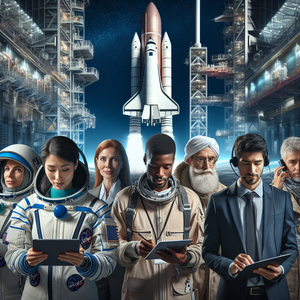
Discovering Career Paths in the Space Sector: 20 Key Roles and Their Requirements
The space industry is an exhilarating field teeming with a myriad of career paths for those who are driven by a passion for exploration, technology, and scientific advancement. While many envision astronauts as the sole representatives of this sector, the reality is far more expansive. From engineering and scientific research to business development and public engagement, countless roles contribute to our quest to understand the cosmos and push the boundaries of space exploration. With increasing interest and investment in space initiatives, the job market in this sector is burgeoning, offering promising opportunities for aspiring professionals.
Job Summaries:
Aerospace Engineer:
- Aerospace engineers are instrumental in designing and developing aircraft and spacecraft.
- They perform tests and analyze data to ensure compliance with safety and performance standards.
- Typically, a bachelor's degree in aerospace engineering or a related discipline is necessary.
- Strong analytical capabilities and proficiency in CAD software are required.
Avionics Technician:
- Avionics technicians focus on maintaining and repairing electronic systems in aircraft and spacecraft.
- They work with navigation and communication technologies.
- A degree or certification in avionics is preferred.
- Strong troubleshooting skills are important.
Satellite Systems Engineer:
- These engineers design and manage satellite systems to fulfill mission objectives.
- Engaging in system architecture and performance analysis.
- A degree in aerospace or electrical engineering is required.
- Experience in satellite operations.
Space Scientist:
- Space scientists explore celestial bodies and analyze data from various missions.
- Specializations can include astrophysics or planetary science, typically requiring a Ph.D.
Mission Control Specialist:
- Mission control specialists oversee and manage space missions in real time.
- Ensuring all systems operate effectively.
- A background in engineering or computer science is desirable.
- Strong analytical skills are important.
Robotics Engineer:
- Robotics engineers develop robotic systems for space exploration, such as rovers and robotic arms.
- A degree in robotics engineering is necessary, along with programming and testing experience.
Data Scientist (Space Applications):
- Data scientists analyze extensive datasets sourced from satellites and telescopes.
- Utilizing statistical methods and machine learning techniques.
- A degree in data science or statistics is essential for this role.
Technical Writer:
- Technical writers create documentation and manuals associated with space missions.
- Excellent writing skills and a solid understanding of scientific concepts are required.
- A degree in English or communications is needed.
Space Policy Analyst:
- Space policy analysts conduct research and analysis of policies impacting space exploration.
- A background in political science or law is necessary, along with strong analytical skills.
Space Education Outreach Coordinator:
- These coordinators craft programs aimed at engaging the public in space science.
- Typically having a background in education or communications.
Payload Specialist:
- Payload specialists oversee experiments conducted during space missions.
- They ensure that all equipment functions properly.
- A relevant scientific degree is essential.
- Specialized training is essential.
Spacecraft Mechanic:
- Spacecraft mechanics are responsible for maintaining and repairing spacecraft systems to guarantee they are launch-ready.
- A strong foundation in mechanical engineering is crucial.
Space Mission Planner:
- Mission planners coordinate logistics for space missions.
- Trajectory calculations are part of the mission planning process.
- Resource allocation is essential for successful missions.
- A degree in aerospace engineering is necessary.
Ground Systems Engineer:
- Ground systems engineers design and manage the systems used to control spacecraft from Earth.
- A degree in engineering or computer science is typically required.
Space Environmental Scientist:
- These scientists study the effects of space environments on equipment and human health.
- A degree in environmental science is essential.
Space Finance Analyst:
- Finance analysts evaluate the financial components of space projects
- Need a degree in finance or accounting
Aerospace Software Engineer:
- Software engineers create software for spacecraft and ground systems
- Necessitating a degree in computer science
Space Health Scientist:
- Space health scientists investigate the effects of space travel on human health.
- They require a background in biology or health sciences.
Space Operations Manager:
- Operations managers oversee mission execution
- Coordinating teams and resources
- A background in engineering or management is typically necessary.
Space Systems Architect:
- Systems architects design frameworks for space systems, ensuring functionality and efficiency.
- A degree in systems engineering is necessary.
The diverse roles outlined here exemplify the wide range of opportunities available in the space industry, showcasing the various skill sets and backgrounds that contribute to this fascinating field. Whether your interests lie in spacecraft design, data analysis, or public engagement, the space sector offers a wealth of career possibilities.
Explore More Jobs

